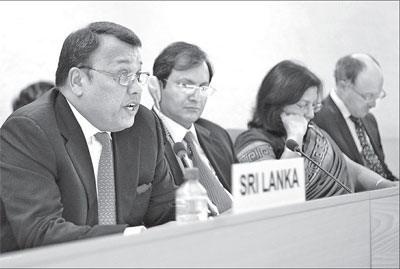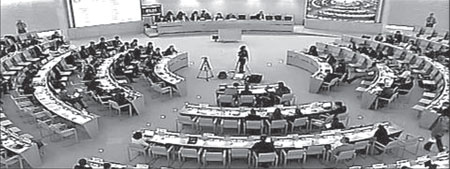JUDGE HUMAN RIGHTS relative to ground reality
Text of the address by Plantation
Industries Minister and Special Presidential Envoy on Human Rights
MAHINDA SAMARASINGHE at the 14th session of the Universal Periodic
Review Meeting of the UNHRC in Geneva
It is my privilege and pleasure to share with the 14th Session of the
UPR Working Group information and perspectives on the action taken to
promote and protect human rights in Sri Lanka in the period since our
first review in 2008. It has been our consistently articulated position
that, in the particular circumstances and context of the Sri Lankan
situation, the UPR process provides the best opportunity to raise
questions and seek clarifications about the evolving situation in the
country.
|

Minister Mahinda Samarasinghe and the delegation in Geneva |
What we had hoped for earlier this year was time and space for Sri
Lanka to complete the work of its domestic process that was in train in
the post-conflict phase.
In March, we stated that the upcoming UPR would prove to be the ideal
platform to discuss all aspects of interest and concern, and today we
appear before you to fulfill that pledge. A country's human rights
situation cannot be assessed in isolation and should be examined in the
context of the realities on the ground. We are ready, prepared and
equipped to brief the Working Group and to engage in a cordial and
productive dialogue, in a spirit of candour and openness, as to the
promotion and protection of human rights in Sri Lanka.
We will also engage with the Working Group on our plans and
expectations to achieve incremental improvements in the human rights
situation in the context of post-conflict peace-building, reconciliation
and the achievement of normality for all our people.
Interactive dialogue
We appreciate the level of interest shown in the present developments
in Sri Lankan - exemplified by the 99 countries that have subscribed to
the list of speakers and the 20 countries that have sent in questions in
advance. As much as we are here to put forth our perspectives, we hope
that, through this dialogue, a greater understanding of the realities in
Sri Lanka will be forged.
I appreciate Australia, Cambodia, Canada, Cuba, Czech Republic,
Denmark, Ethiopia, Germany, Ireland, Liechtenstein, Mexico, Netherlands,
Norway, Pakistan, People's Republic of China, Slovenia, Spain, Sweden,
United Kingdom, United States of America, who have indicated their
interest by presenting questions that permit a more focused discussion.
In the course of my presentation and those of my fellow delegates, we
will respond to these questions. I would like to take this opportunity
to introduce my delegation so that those of our peers participating in
this interactive dialogue would be assured that the right people are
available to authoritatively answer any question. I look forward to
receiving the recommendations that countries may propose and assure you
that we will give them our serious consideration.
|

Fourteenth session of the Universal Periodic Review Meeting of
the UNHRC in Geneva |
Let me say a word on our former engagement during the first cycle of
the Review and the steps we have taken pursuant thereto. In May and June
of 2008, I was privileged to lead the Sri Lankan delegation to its
initial UPR. We received many recommendations, a majority of which we
were able to agree to.
We were forthright in informing our interlocutors as to those with
which we could not agree. We also made several voluntary pledges in
keeping with our national goals and priorities. That UPR presented Sri
Lanka with the opportunity of taking a structured and holistic view of
human rights in the country. This was true of the internal and external
dimensions of human rights. Internally, we were able to take stock of
our strengths and the challenges before us. Externally, we were able to
better coordinate and communicate our achievements with our friends and
partners.
The chief positive that we can draw from that engagement in 2008 was
the formulation of the National Action Plan for the Promotion and
Protection of Human Rights (NHRAP). This was one of our principal
pledges, made in keeping with the Vienna Declaration and Programme of
Action of 1993.
Firmly based on our national plans and priorities, we took into
account the recommendations accepted and the pledges made,
recommendations of treaty bodies and special procedure mechanisms in
devising this plan. We commenced work almost immediately thereafter to
draft the Action Plan. Civil society representation was invited and
co-opted into the exercise. Finally, senior officials reviewed the
Action Plan and I presented it to the Cabinet which granted its approval
in September 2011.
In December, the implementation strategy was also approved by Cabinet
including institutional arrangements for coordination and monitoring. It
was an extensive, time consuming process, but one that we are satisfied
with.
Protection of Human Rights
Our civil society partners were fully involved - having near equal
representation on the drafting committees. Government focal points were
also extensively consulted prior to obtaining final approval.
We have been engaged in the initial stages of implementation during
the past 10 months and will be able to undertake a review towards the
end of the year. It is also important to acknowledge that, although we
received some initial material support from the UN Country Team in Sri
Lanka, we ensured that the preparation and implementation of the Action
Plan is a nationally driven and nationally owned exercise. Several
delegations have raised questions as to implementation of this National
Action Plan which we call the NHRAP. It addresses eight thematic areas,
viz., civil and political rights, economic, social and cultural rights,
children's rights, labour rights, migrant worker rights, the prevention
of torture, women's rights and the rights of IDPs. I am happy to share
specific examples of implementation which we have achieved in the course
of this year so that our friends and peers would be able to appreciate
our clear commitment towards the promotion and protection of human
rights in Sri Lanka.
* We are preparing draft legislation on occupational safety, health
and welfare at work and this is being done by the Ministry of Labour and
Labour Relations (under Labour Rights);
* Directives have been issued by the Police Department to ensure
physical safety of persons taken into custody and the provision of
access to legal counsel as of right (under Prevention of Torture)
To be continued |





